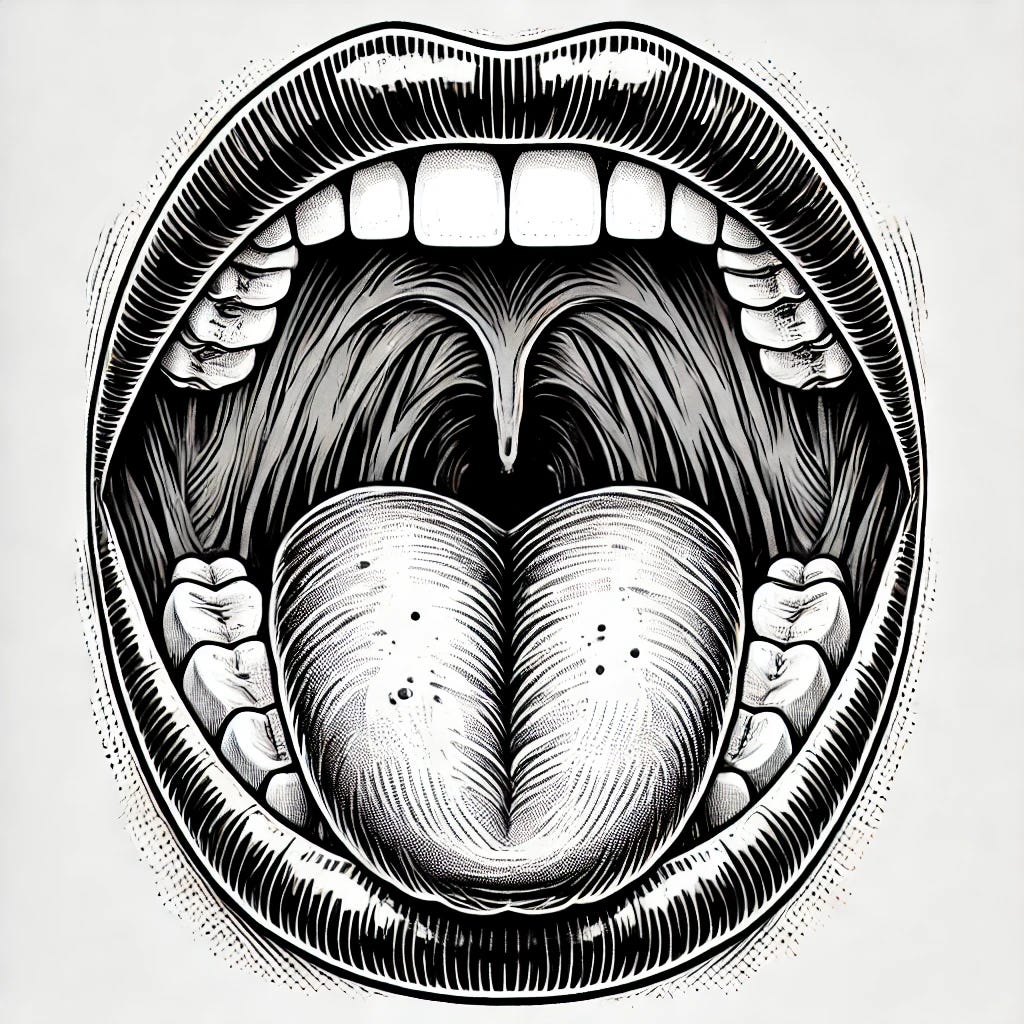That little dangly thing all the way at the back of your mouth is called a uvula. In Latin, uva means grape, so uvula is something like “little grape.”
This little grape looks kind of like a boxing speed bag, or maybe a little bit like a tree ornament, or a dripping stalactite. It’s not just there for looks, though! It serves a few important purposes.
For one thing, your throat is connected to your nose by way of your nasopharynx, so it’s incredibly important that food and drinks don’t end up going down your trachea (windpipe). Of course, this happens every now and then anyway, but it’s pretty terrible, and I really don’t recommend it. Plus, you might die.
The uvula is a part of your soft palate, that back region of your mouth where you can feel that there’s no bone on the roof of your mouth. The soft palate and the uvula can move upward, helping you plug off your nasopharynx, kind of acting like a drain stopper.
What else can this little grape do?
If you’ve ever spoken French, but it’s not your first language, you might have had a problem with a few of the sounds you make. The words are different, of course, but the actual spoken sounds are also a bit different, at least in a few notable areas.
One of these areas is when you roll the letter R in French. If you’re a native English speaker and you try this for the first time, you’ll probably roll your tongue, like a rapidly repeating D, or a bit like making a drumroll sound.
That’s not at all what native French speakers do! Instead, they tend to utilize the uvula, making a sound similar to when you clear your throat, but with a lifetime of practice and control, transforming the vulgar into the elegant. Native French-speaking friends, please let me know if I got this right!
Arabic, too, involves the uvular R, but Spanish does not. I feel like there’s a really good etymological thread to pull on here, since the Iberian peninsula came under the control of the Umayyad Caliphate at the start of the 8th century, but the region where France is today did not. How curious!
Is it possible that the uvula has something to do with our ability to make speech? Evolutionary linguists aren’t sure, but humans are the only ones with fully developed uvulas, and it certainly couldn’t hurt to be able to make new sounds.
Besides language, the uvula can also make saliva. This is less of a superpower, since saliva can be made in other parts of the mouth, but when you’re swallowing, the uvula is in the perfect place to help lubricate the rest of the food’s journey.
And, there’s one more thing that I want to talk about today: puking. Touching your uvula sends a signal to your brainstem, where the information is processed and the response coordinated. The brainstem sends signals to the throat, where the muscles contract quickly.
Here, just like when you swallow, your uvula (and its base of operations, the soft palate) rise up to close off your nasopharynx. There goes nature, recycling and reusing movements whenever possible!
I hope you’ve enjoyed today’s very brief uvular journey. Speech, puking, and continuing to breathe are all very good things, and I’m grateful for the role this little dangledoodle plays.
Today, see if you can’t try rolling that uvular R during a conversation. Think about that soft palate while you’re eating, and how it and the uvula stop your throat up so you don’t choke. Paying attention to these little things once I know a bit about them gives me the one thing I really want each day: a sense of wonder.






"And, there’s one more thing that I want to talk about today: puking."
There it is! I wondered when you'd move on from poop to other bodily functions. You didn't disappoint!
I’m going to have to search my Facebook now to find exactly what my daughter said, but one time she called it her vulva hahaha! It was after watching Monster House - the house was living and had a uvula.
But, you also made me look up “guttural” because I took a linguistics class back in undergrad and remembered something about it, but couldn’t remember exactly. The uvular r in German is guttural, but probably not the uvular r in Spanish. The definition is “a consonant articulated in the back of the mouth or throat” - but, it’s like a harsh sound if I’m remembering correctly. I loved learning about linguistics.